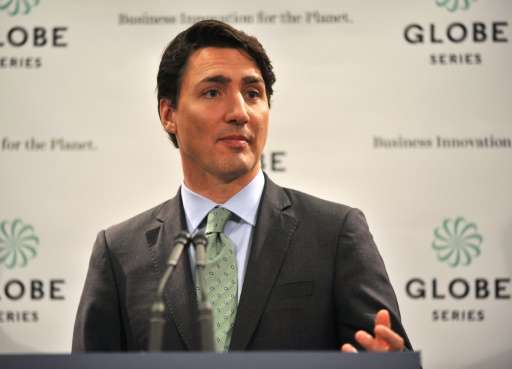Trudeau seeks climate consensus among Canada's 10 provinces

Prime Minister Justin Trudeau on Wednesday urged the leaders of Canada's 10 provinces to come together to tackle climate change, as a self-imposed deadline looms to start cutting CO2 emissions.
"We begin from the common goal we all share. We want a low carbon economy that continues to provide good jobs and create opportunities for all Canadians," Trudeau said in Vancouver before sitting down with provincial premiers.
"To get there, we need to make smart, strategic investments in clean growth and new infrastructure," he said.
Elected in October, the Trudeau government brought to Paris climate late last year the same goals of the previous Tory administration: reducing greenhouse gas emissions by 30 percent by 2030 compared to 2005 levels.
But at those talks, Environment Minister Catherine McKenna said this was only a floor and that she would within 90 days try to negotiate deeper cuts with Canada's provinces, which share responsibility for the environment with Ottawa, to help keep global temperatures from rising more than 1.5 degrees Celsius.
Each has very different economic circumstances and goals, and many have already started taking their own tailored approach to reducing emissions, which Trudeau has encouraged.
British Columbia and Alberta, for example, have carbon taxes, while Ontario and Quebec are members of a fledgling continental cap and trade system.
The lone hold-out, Saskatchewan Premier Brad Wall has vowed to reject a carbon tax he says will cost the prairie province's economy up to Can$1 billion, which could scuttle Trudeau's desire for a national carbon price floor.
On Wednesday, Trudeau pledged tens of millions of dollars for research into alternative energy and to help municipalities adapt to warming, including revising building codes to boost energy efficiency.
Alluding to Quebec seeking an injunction to block a pan-Canadian pipeline from Alberta to Atlantic Coast refineries, he said "the choice between pipelines and wind turbines is a false one."
He said Canada, which is the world's fifth largest oil producer, must continue to exploit its vast natural resources in order to fund the transition to a low-carbon economy.
Addressing climate change "is one of the great global projects of our time, and I know Canada is ready to take it on," he said.
© 2016 AFP



















